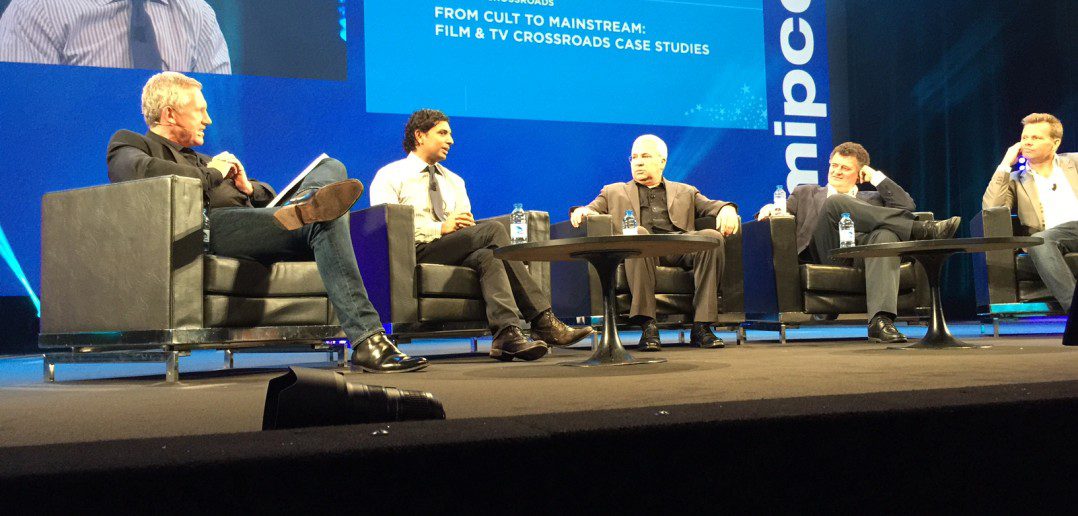Science fiction isn’t a cult: it’s mainstream now, with shows like Doctor Who drawing sizeable global audiences. One of the most anticipated panels at MIPCOM this year was the From Cult to Mainstream session this morning, moderated by Julian Newby, editor-in-chief of MIPCOM News.
The four panelists joined the discussion one by one, starting with Ben Donald, executive producer of The Refugees for BBC Worldwide. He explained that the show examines the effect on families in a small isolated community where « globally billions and locally thousands » of refugees suddenly turn up. « We’ve used that as a premise to see how this event acts as a sort of poison drop to bring out secrets and hidden stories in our protagonists, » he said. « If some sci-fi is ‘out there’ this is more like ‘near-fi’. » Less monsters, aliens and high concepts, and more « what would you do? » tension.
The project is the first time BBC Worldwide is a distributor rather than a production company, but it also acted as the initiator of the project: a co-commissioner said Donald. « We’re always looking for interesting ways to augment our catalogue, » he said. « We were also admirers of a certain type of drama… We were 50/50 partners with a Spanish production company and a Spanish broadcaster. »
Is this sci-fi then? « The great thing about sci-fi, like some of the other great genres like crime, is it’s now so full of subsets. You have relationship crime, soft crime, psychological crime, female-led, whatever… I’m not one of the world’s sci-fi geeks, but we are acutely aware at BBC Worldwide that this is a genre that sells well around the world, » he said. « What interests me is it can hold up a metaphor to the world… here our refugees stand for the immigration debate. This isn’t a soapbox show that’s didactic… but we’re living in a time where there are more displaced human beings than at any time since the Second World War. Look at Syria and Iraq. It feels incredibly relevant. Yet we’ve managed to make an entertaining, scary, psychological thriller. »
How careful does it have to be on the creative side? « You have to make sure the rules of your universe are absolutely watertight, » he said. « You have to believe in he strength of your characterisation and the strength of your plot will take people in… You’ve got to have confidence that they will pick things up and feel comfortable with the rules and logic. »
They were joined at this point by Steven Moffat, executive producer and lead writer of Doctor Who, and co-creator and executive producer of Sherlock. Newby asked him about rules and logic: and specifically, travelling backwards and forwards in time. « Well, you can definitely travel forwards in time, just quite slowly! But backwards does seem to be a logistical problem, » he grinned. « But it says you can do so in Doctor Who, and Doctor Who is never wrong! »
Doctor Who used to be seen as a domestic hit, although Moffat pointed out that the original shows had been sold abroad. « I think it’s the kind of show that can go anywhere. We make it in Cardiff, but it’s set in and around all time and space. It’s not culturally specific! » he said. « Obviously we go hell for leather on the sci-fi fantasy aspect of Doctor Who because the main character lives in a box that can travel through time, and can change his face… the show has to match up to that. You can’t introduce a character like that and just have him teaching a school, can you? »
But he said the show is quite emotionally grounded. « It is frequently the intimate moments in Doctor Who that make it connect with its audience… it is sci-fi that people who don’t like sci-fi watch. Although we never make any apology about Doctor Who being as science fiction as it gets. We don’t like to have a scene without a robot or a talking slug coming along! »
He talked about the famous twist of the Doctor changing every few series: not just a different actor, but often a very different character – as seen in the most recent transition from Matt Smith to Peter Capaldi. « Doctor Who can be a star vehicle, and yet counterintuitively be a star vehicle now for 12 separate actors… it’s a brand new show every few years. You don’t just recast the lead, you change the lead character. »
Moffat talked about Sherlock and the creative decision-making process behind it, especially with so many Sherlock Holmes societies around the world who might be cross about some of those decisions. « They very rarely take to the streets with weaponry, Sherlock Holmes fans! » he said, before stressing that he himself is one of those big fans. « We thought we had a different angle on it that would work… Actually updating Sherlock Holmes as we automatically update James Bond, was the right thing to do… Sherlock Holmes is meant to be pulpy and vital and new. »
Was he nervous? No, excited. « There was a moment when my new version of Doctor Who was about to come out in the same few months as Sherlock was about to come out. And I thought if I screw these up, all I’ll have to do is shoot Daniel Craig in the face and I’ll have screwed British culture! »
At this point, they were joined by Glen Morgan, showrunner and writer of US drama Intruders, which is based on a novel: a « psychological, paranormal, conspiratorial thriller » as he put it, with four or five different story strands all coming together to reveal that there’s a secret society that has learned to control reincarnation. But Morgan also worked on The X-Files back in the day. « That subject matter, audiences have always wanted it, » he said. « The Twilight Zone had been very successful and Star Trek had been very successful… if you look at X-Files it filled a hole that had been there. The audience has always wanted it, you just had a generation of studios and the people that greenlit projects who just weren’t comfortable with the geek thing! »
Why do these shows have so much success and popularity now – escapism? « The genre, whether it’s horror or science fiction, always seems to be a little ahead of the curve historically. Godzilla was talking about nuclear annihilation... »
Cinema has been doing this for a long time, with huge hits in the paranormal and sci-fi genres. Until about 20 years ago, it was often seen as a « jokey quirky thing » suggested Newby. But is its current popularity about the crossover between those two media? « It’s technically possible now to make TV shows that look as good as movies, » said Moffat. Did people laugh? « You may have laughed, I did not laugh! » he said in mock outrage. « Anyone that laughed was wrong! »
The final guest in the session was M. Night Shyamalan, whose latest project is US drama Wayward Pines, which has been one of the hits of MIPCOM this year. And which does include elements of comedy alongside its scary parts. « It was actually the humour that really drew me to it. It’s something I secretly wanted to do: make comedies! » The show is about a secret agent investigating the disappearance of two colleagues in a mysterious town called Wayward Pines. « Everyone is extremely nice, and extremely polite, and very strange… they won’t answer [questions], and just keep offering pie. »
He’s been interested in television for a while, having made films since his teenage years, but admitted to having been intimidated by the different rhythm of storytelling required in a series compared to a movie. « This is completely new math for me. I was terrified. So I said no a lot, » he said, of being offered TV projects. And he agreed that sci-fi is a great way to talk about other kinds of fears in the world. « It’s a wonderful way to talk about our anxieties. I do think science-fiction is that thing… My instinct in general is to take a big subject, and reference it and then don’t talk about it any more… it’s way over there in the show, and that keeps it powerful. »
Moffat chipped in, talking about « if you can monsterise things that exist in people’s real life, then they’ll be frightened » in comparison with simply having massive computer-generated monsters stomping around – although Doctor Who has those. What else informed Shyamalan’s enthusiasm and his work? « Ultimately what we’re doing is some kind of psychological trick in creating stories about the unknown in things that are known, » he said.
About that transition from film to television, then. Will he go back the other way now? Why treat this subject in a serious format rather than a 90-minute movie? « My normal thrillers take a year and a half to two years to do. That’s a long time to wait to talk to your audience and to have a relationship. I would love to be able to tell more than 20 stories in my life, or 30 stories in my life, » he said. « This taught me a lot. I’m super-precious, probably in a bad way with my thrillers: no one changes a word… but this, these guys move so fast… so it made me less precious on the set… And there were wonderful edges that came out of that, that normally weren’t there. As filmmakers, bad habits creep in… And I got to hire all these wonderful directors for the series. »
When did sci-fi become cool? Shyamalan talked about the fans. « I think with the internet they were given the keys to he kingdom. They used to be fringe and now they’re the doorkeepers of everything, » he said. Morgan suggested that Star Wars played a big role before that. « It’s a pattern that applies to lots of things, » said Donald: things start as niche communities, then become cool, then become popular. And often then become uncool again when they get « too popular ».
How does Moffat balance serving fans and giving them what they want, versus surprising them with things they don’t know they want (yet)? « You don’t give them what you think they want. That would be mad! The only useful index you’ve got is what you would like, » he said.
« It’s really a strange way to write a story, and an arrogant way to write a story: to give them what they want. You don’t even know what birthday present to give the person close to you! How would you know what everybody wants?, » he said. I honestly don’t think anybody makes a film or television programme for any reason other than ‘wouldn’t it be brilliant to get someone to pay me to do this?' »
Shyamalan took the point on: « This collision of art and commerce is a tricky one. Because let’s say for example someone says ‘this is a big video game, let’s make a movie about this video game’. That’s commerce leading art to make that. That’s when things start to become soulless, and we’re either going to be unsuccessful in a creative way, or in a creative and a financial way. Let’s say someone comes in saying ‘I love this video game, I would love to make a movie about that’. That’s art leading commerce… That tends to work out better because you’re staying closer to the vein. »




